
Guests
- James Grimaldiexecutive editor of National Catholic Reporter.
- Bryan Massingaleprofessor of theological and social ethics at Fordham University in New York. He identifies as a Black, gay Catholic priest.
The first U.S.-born pope has taken the name Pope Leo XIV. Chicago-born Cardinal Robert Prevost is also a naturalized citizen of Peru, where he served the church for two decades. He greeted 1.4 billion Roman Catholics and the world Thursday with a message of peace and has posted statements online in support of migrant rights and criticized the Trump administration. In the first part of our discussion, we go to Rome for an update from James V. Grimaldi, executive editor of National Catholic Reporter, and speak with Father Bryan Massingale, a Catholic priest and professor of theological and social ethics. “We need him to step into that void of moral and ethical leadership that we have in our world right now. And we also need the pope to be a prophet of hope in these uncertain times,” says Massingale.
Transcript
AMY GOODMAN: This is Democracy Now!, democracynow.org, The War and Peace Report. I’m Amy Goodman.
The first-ever pope from the United States has been chosen to lead 1.4 billion Roman Catholics. Cardinal Robert Francis Prevost was elected on the second day of the conclave. He’s chosen the name Leo XIV, suggesting a possible emphasis on social justice. Pope Leo XIII, who ruled from 1878 to 1903, condemned slavery as a, quote, “wretched yoke that has oppressed many people.” Leo XIV called for peace and dialogue as he addressed the faithful from the Vatican Thursday.
POPE LEO XIV: [translated] Peace be with you all. Beloved brothers and sisters, this is the first greeting of the risen Christ, the good shepherd who gave his life for God’s flock. I, too, would like this greeting of peace to enter your hearts, to reach your families. To all people, wherever they may be, to all peoples, to all the Earth: peace be with you.
AMY GOODMAN: Pope Leo grew up on Chicago’s South Side. He’s also a naturalized citizen of Peru, where he served the church for two decades. Today, Friday, he spoke in his native English as he held his first Mass as pontiff.
POPE LEO XIV: I begin with a word in English, and the rest is in Italian, but I want to repeat the words from the responsorial psalm. I will sing a new song to the Lord, because he has done marvels, and indeed, not just with me, but with all of us, my brother cardinals.
AMY GOODMAN: Within the past month, Pope Leo has criticized the Trump administration. Just weeks ago, his account on X responded to Vice President JD Vance’s invocation of a Christian principle to justify the mistreatment of immigrants by sharing a piece from the National Catholic Reporter headlined, quote, “JD Vance is wrong: Jesus doesn’t ask us to rank our love for others.”
Last month, Pope Leo reposted another account’s rebuke of President Trump’s Oval Office meeting with Salvadoran President Nayib Bukele and referenced instead an op-ed by the auxiliary Catholic bishop of Washington, D.C., about the suffering of migrants Trump had sent to the notorious CECOT prison in El Salvador that read, quote, “Do you not see the suffering? Is your conscience not disturbed?” unquote.
Back in May of 2020, the account reposted several tweets of sympathy for the family of George Floyd after he was killed by Minneapolis police, and wrote, quote, “We need to hear more from leaders in the Church, to reject racism and seek justice,” unquote.
This all comes as the new pope also previously attacked LGBTQ+ people and said, quote, “homosexual lifestyle” is incompatible with the Catholic Church. And survivors of sexual abuse by Catholic priests are calling on him to institute a zero-tolerance policy and an investigation into his handling of prior sexual abuse allegations.
We’ll talk more about all of this with our three guests, but we’re going to begin in Rome with James Grimaldi, executive editor of the National Catholic Reporter, winner of multiple Pulitzer Prizes. His latest piece is headlined “The pope from Chicago backed Pope Francis’ major church reforms.”
James Grimaldi, welcome to Democracy Now! Start off by telling us who, well, the man who used to be called “Father Bob” is.
JAMES V. GRIMALDI: Well, yes, as you’ve pointed out, he’s from South Chicago. One of his classmates said he was most likely to be pope out of that class, which was quite a prediction. He entered the Augustinian Order in the late ’70s. He went to Peru as part of a missionary. He really believed in the missionary work. But he was brought back to Rome twice for a couple of assignments by Pope Francis. And I think his work in the curia here, as well as his missionary work and his outreach to the peripheries of the church, may have landed him in this job.
But I do want to note, Amy, that the headline that you’ve been reading, you’ve read twice, I wrote that headline, “JD Vance is wrong.” And I actually commissioned that op-ed that the future Pope Leo tweeted. And it’s extremely humbling as a lifelong Catholic to have the pope of my church actually tweet words that I wrote. It’s kind of chilling to me.
And I will tell you the history of that commentary. When JD Vance made those statements on Fox News justifying the treatment of immigrants in the United States by misstating the theology of the Catholic Church, this was a big story for us. It went up on the homepage almost immediately. And then, when Pope Francis pushed back on it, I wanted more stories. And then I said, “Let’s go to Kat Armas,” who is a Cuban American feminist theologian based in Miami. There’s a book coming out, and you should have her on when her book comes out, about empire and the church. I said, “Let’s get Kat to write an op-ed for us about this, about JD Vance’s thoughts on the Catholic theology and immigrants.” She wrote that, that op-ed, and I said, “This is a great op-ed. We need to put a good headline on it.” And, you know, 40 years in journalism at The Washington Post and The Wall Street Journal, I know how to write a headline. And apparently I got the attention of Cardinal Prevost, and he retweeted it — or, tweeted it, actually. He literally cut and pasted the words that I wrote into that tweet and shared the commentary that was on NCRonline.org. And so, I just have to say I’m humbled today to be sitting where I am.
AMY GOODMAN: I want to ask you about other tweets. Now, again, we can’t absolutely confirm that they’re his, but in response to Vance’s anti-immigrant remarks on Fox News, then-Cardinal Robert Prevost shared an article on X headlined, as we were just talking about, “JD Vance is wrong: Jesus doesn’t ask us to rank our love for others,” that, as you said, you wrote the article to, the article by Kat — you wrote the headline to. The article by Kat Armas reads, in part, quote, “The love Jesus speaks of is not about calculation or a choice between our families or neighbors. It is not a finite resource to ration out, but a river that flows, wild and without restraint. The empire’s vision of love is built on scarcity, but the kingdom of God is built on abundance. If we find ourselves asking, 'Who is my neighbor?' — we are already missing the point. The better question is: How do I love without limits?” unquote. Let me go to father Bryan Massingale —
JAMES V. GRIMALDI: Yeah, it gives me chills to hear you read that, Amy.
AMY GOODMAN: — who’s here in — go ahead, James.
JAMES V. GRIMALDI: Yeah, no, it gives me chills to hear you read that again, because, you know, this is my church. That’s the church I believe in. That’s the church of Pope Francis. I mean, this is the church of the National Catholic Reporter. You mentioned that other op-ed that was written by the auxiliary bishop in Washington, D.C., first published in the Catholic Standard. And as soon as I saw that, I said, “We’ve got to have that,” and we put that up. And I daresay that Pope Leo XIV is a reader of NCRonline.org. And again, I’m kind of humbled.
AMY GOODMAN: I want to go to Father Bryan Massingale, professor of theological and social ethics at Fordham University in New York, a Black, gay Catholic priest. He’s the author of Racial Justice and the Catholic Church. His recent article for the monthly Catholic magazine America is headlined “Pope Francis and the future of Catholic moral theology.” Of course, that’s before the new pope was chosen. Father, it’s great to have you with us. Can you respond to what you know of, well, the man we used to know as “Father Bob,” who is now Pope Leo XIV?
FATHER BRYAN MASSINGALE: Well, yesterday, I was watching the news, as everyone else was, and I was just shocked that they would choose an American. But then, when I saw how he presented himself, and I realized this is perfect, because I was reading an Italian commentator who said that he is the least American of all the Americans that are in the curia. And I think what he meant by that is that he’s showing the world that there is another way of being an American besides what we’re seeing in the current administration, that being an American doesn’t mean scapegoating migrants, being an American doesn’t mean exiling them to detention camps, being an American means that we can stretch out our hands to the least and the vulnerable. And I think that that can’t be — that couldn’t have been lost upon the cardinals who elected him. They’re not, you know, naive about the politics of this.
And so, I was extremely gratified, especially when I heard the name Leo XIV. I mean, it’s unmistakable that he sees himself as being — as advancing the lineage of Catholic social teaching with its concerns for the rights of workers, with its concerns for the least among us. I think that’s exactly who he’s — he’s trying to telegraph something, and he’s doing it very deliberately by the choice of his name.
AMY GOODMAN: And go further on that choice of name, who Leo XIII was, the emphasis on immigrants and laborers.
FATHER BRYAN MASSINGALE: The emphasis on immigrants, laborers, I think you have to remember that at the time of Leo XIII, the church had decisively aligned itself with the rich, the wealthy, the aristocracy. And Leo XIII himself was an aristocrat, but he saw that the Catholic Church was losing ground. It was losing grounds to those who were championing for social justice, such as Marxists at the time. And so, Leo XIII realized that the church had to embark upon a different path, and so he wrote an encyclical, a formal document, called Rerum novarum, “Of New Things.” And one of the new things that Leo was pointing to was that in light of the Industrial Revolution, the church had to align itself definitively with the plight of workers. And so, the ideas of a just or living wage came into Catholic social teaching and has been a part, a pillar, of Catholic social thought ever since. So, by deliberately invoking Leo XIII and by naming himself after Leo, there’s no doubt that the new pope wants to continue to see the church be a voice for the voiceless and for the marginalized.
AMY GOODMAN: And, Father, what is the new pope Pope Leo’s record on racial justice and also on LGBTQ people? He, to quote him, talking about the “homosexual lifestyle,” saying it’s incompatible with the Catholic Church.
FATHER BRYAN MASSINGALE: Well, let’s take them in reverse order. You asked about his record on LGBTQ issues. I saw that headline. That quote has been getting a lot of press. But then I remembered that Pope Francis, before he became pope, also gave an interview in which he condemned same-sex marriage. He called it a machination of the devil and a father of lies. And so, what I’m trying to point out is that the Pope Francis who was elected in 2013 is not the Pope Francis who we buried in 2025, and that when Pope Francis and now Pope Leo made those remarks about LGTBQ issues, they made them under the pontificate of Benedict the XVI. The church has changed since then. The church has moved. Pope Francis has moved and evolved. And I have to believe that Pope Leo has also changed and evolved since then. So I’m going to be waiting with eagerness to see just how far he’s evolved and how far he’s moved. And so, I wanted to just caution especially LGBT Catholics who are looking at what he said back in 2012, what Pope Leo XIV said back in 2012, to not necessarily assume that that’s his position now in 2025.
AMY GOODMAN: When I watched him today in the Sistine Chapel addressing the cardinals, there were two women who did readings. They were first.
FATHER BRYAN MASSINGALE: Yes.
AMY GOODMAN: The significance of this? Because, obviously, this was his choice.
FATHER BRYAN MASSINGALE: Obviously. And I think, with understanding the Catholic Church, symbolism is a telegraph. It’s a smoke signal. It’s telling you something. And I think that we have to understand that this man is going to be in marked continuity with the initiatives of Pope Francis, that he wants to continue to advance the position of women.
Now, I think we need to understand that these guys are not progressives as we would understand them in the American vernacular. But the Catholic Church is a global church, an ancient church, and it moves slowly. Pope Francis opened doors. And I think that it’s up to Pope Leo now to help the church to continue to walk through those doors, especially in the advancement of women and LGBTQ issues.

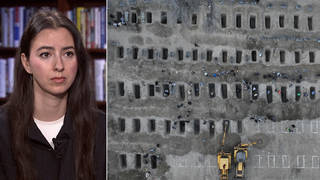
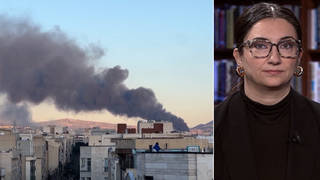
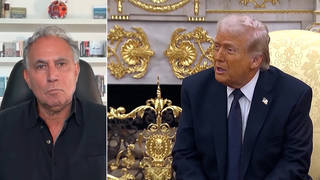
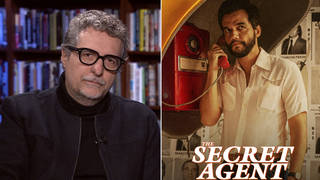

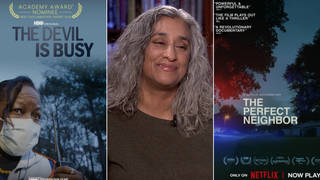
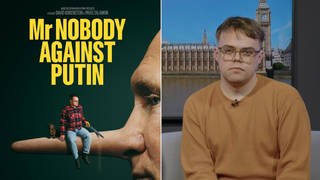

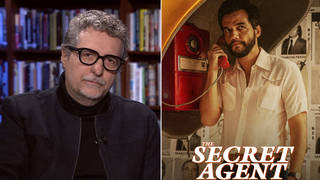
Media Options